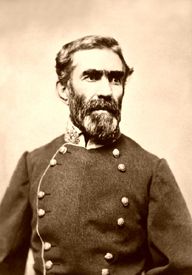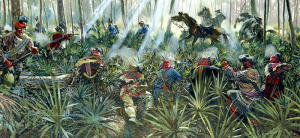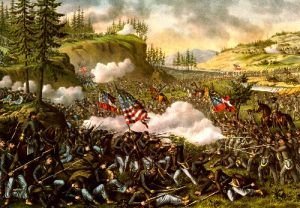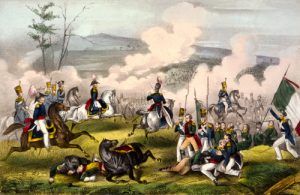A career United States Army officer, and then a general in the Confederate States Army, Braxton Bragg was the principal commander in the Western Theater of the Civil War and later the military adviser to Confederate President Jefferson Davis.
Bragg was born in Warrenton, North Carolina, on March 22, 1817, one of Thomas and Margaret Crosland Bragg’s six sons. He was often ridiculed as a child because of rumors about his mother’s prison sentence for allegedly murdering an African American freeman, and some of those rumors stated that he was born in prison. Despite these rumors, the Bragg family was law-abiding.
Although considered by his neighbors to be from the lower class, Thomas Bragg was a carpenter and contractor who became wealthy enough to send Braxton to the Warrenton Male Academy, one of the state’s best schools. Braxton was admitted to West Point at the age of 16. His classmates included notable future Civil War generals Joseph Hooker, John C. Pemberton, Jubal A. Early, John Sedgwick, and William H.T. Walker. He graduated fifth of fifty cadets from the West Point Class of 1837 and was commissioned a second lieutenant in the 3rd U.S. Artillery.
Bragg served in the Seminole War and distinguished himself during the Mexican-American War. He resigned from the army in 1856 and was overseeing his Louisiana plantation when the Civil War began. In 1861, he was appointed and confirmed a brigadier general in the Provisional Army of the Confederate States and was placed in command of the defenses along the Gulf Coast.
He was promoted to major general in September 1861 and assisted General Albert S. Johnston at the Battle of Shiloh, Tennessee, in April 1862. Soon after the battle, he was elevated to the rank of general and, in June, replaced General P.G.T. Beauregard as commander of the Army of Mississippi, later renamed the Army of Tennessee. He led this army into Kentucky, where he met defeat at the Battle of Perryville in October 1862. His next major battle was fought against Major General William S. Rosecrans along the banks of Stones River, Tennessee, from December 31, 1862, to January 2, 1863.
After being pushed out of Middle Tennessee and Chattanooga, Bragg defeated Rosecrans at the Battle of Chickamauga, fought over several days in September 1863. He then besieged the Union army in Chattanooga until November, when forces under General Ulysses S. Grant’s command forced him to retire into Georgia. He resigned his command, and Joseph E. Johnston took his place as commander of the Army of Tennessee. President Jefferson Davis called Bragg to Richmond, where he was placed under the Confederate president’s direction “with the conduct of the military operations in the armies of the Confederacy.”
He lost his plantation during the war when the Federal Army confiscated it. He and his wife then moved in with his brother, a plantation owner in Lowndesboro, Alabama, but they found the life of seclusion there to be intolerable. In 1867, Bragg became the superintendent of the New Orleans waterworks, but he was soon replaced by an African-American as the Reconstructionists came to power.
In late 1869, Jefferson Davis offered him a job as an agent for the Carolina Life Insurance Company, but Bragg didn’t like the work or the low pay, staying for just four months. In August 1871, he was employed by the city of Mobile, Alabama, to improve the river, harbor, and bay, leaving after quarreling with a “combination of capitalists.” Moving to Texas, he was appointed the chief engineer of the Gulf, Colorado, and Santa Fe Railroad in July 1874. Still, within a year, disagreements with the board of directors over his compensation caused him to resign. He remained in Texas as an inspector of railroads. At the age of 59, Bragg died shortly after collapsing in the street in Galveston, Texas, on September 27, 1876. An inquest ruled that his death was due to “fatal syncope,” possibly induced by organic disease of the heart. He is buried in Magnolia Cemetery, Mobile, Alabama.
Bragg’s legacy is not generally positive as he has been described as a “bumbler” with shortcomings including unimaginative tactics, mostly his reliance on frontal assault, and lack of post-battle follow-up that turned tactical victories or draws into strategic disappointments.
His sour disposition, a penchant to blame others for defeat, and poor interpersonal skills undoubtedly caused him to be criticized more directly than many of his unsuccessful contemporaries. Even some of his staunchest supporters admonished him for his quick temper, general irritability, and tendency to criticize innocent men with barbs thrown during his frequent fits of anger.
© Kathy Weiser/Legends of America, updated January 2021.
Also See:




